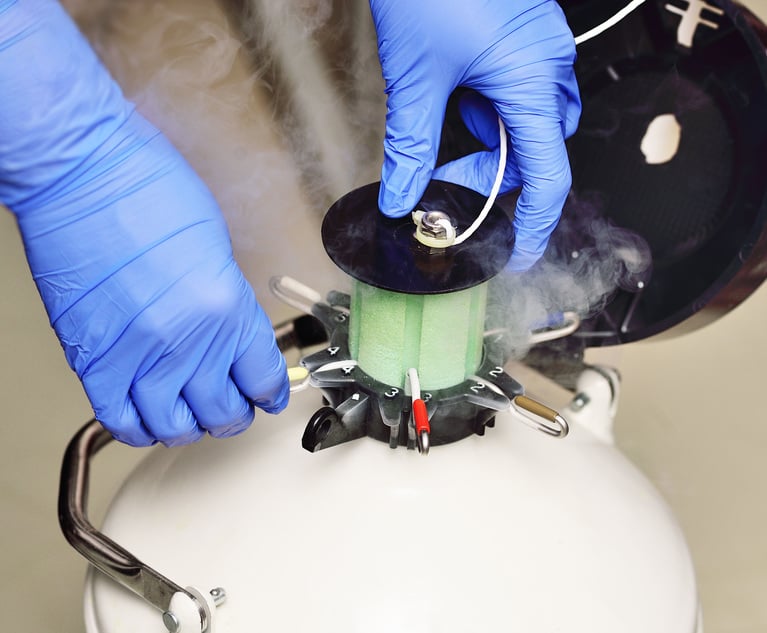 Hartford attorneys DeVaughn Ward, left, and Ken Krayeske.
Hartford attorneys DeVaughn Ward, left, and Ken Krayeske.Impact Fund Grant Goes to Hartford Attorneys for Hep-C Battle
A pair of Hartford solo practitioners working to combat a potential hepatitis C epidemic in Connecticut state prisons has been approved for a $35,000 grant from the Berkeley, California-based Impact Fund.
June 11, 2019 at 06:37 PM
6 minute read
A pair of Hartford solo practitioners working to combat a potential hepatitis C epidemic in Connecticut state prisons has been approved for a $35,000 grant from the Berkeley, California-based Impact Fund.
Attorneys Ken Krayeske and DeVaughn Ward received word of the approval late last week and said in interviews that the money will be used for depositions, transcripts, medical records and expert witnesses in a case that could end up costing the state more than $150 million.
“There aren't many organizations like the Impact Fund around the United States that are giving private lawyers money to wage a fight,” said Krayeske. “We were going to wage the fight with or without them, but we are very honored to have them on board.”
Reached Tuesday, Impact Fund Deputy Director Teddy Basham-Witherington said the grant for the Connecticut lawsuit has been given in the spirit of combating discrimination against the poor and people of color. “Race and class bias is embedded in our criminal justice system, and when you combine that with a refusal to treat an already deadly virus, populations that are disproportionately incarcerated are effectively given a death sentence,” he said. “What this lawsuit does is seek to address that injustice.” Impact Fund grants are paid back in the event of victory at trial, but reimbursement is not required in the event of a loss.
Krayeske said attorney Ward brought the potential class action to his attention last year, while the lawyers were teaming up on a medical neglect case for former state prisoner Wayne World. While behind bars, World was incorrectly diagnosed and treated for psoriasis for three years when he actually had skin cancer. The state settled the case last August for $1.3 million.
Krayeske and Ward, winners of Game Changer and New Leader in the Law awards, respectively, this year from the Connecticut Law Tribune, filed suit on behalf of inmate Robert Barfield last December against former Department of Corrections Commissioner Scott Semple. The lawsuit seeks monetary and punitive damages for the state's alleged deliberate indifference in failing to provide treatment to Barfield, in violation of his Eighth Amendment rights. The complaint goes on to seek “declaratory and injunctive relief on behalf of all CT DOC prisoners with hepatitis C, so that they can receive the treatment that they desperately need.”
The attorneys have since added four plaintiffs to the complaint, but say it's just the tip of the iceberg. Estimates of the overall rate of infection range from one in every four inmates to more than four in 10. “Prison is ground zero for hepatitis C,” Krayeske said. “The standard of care has changed, and we now have the means to cure it.”
Highly contagious, hepatitis C, or HCV, causes severe liver damage if left untreated. The Washington Post reported last year that state prisons were failing to treat at least 144,000 inmates across the country who had been infected. Ten states have begun addressing the problem by administering recently developed direct-acting antiviral medications that can eradicate HCV in two to six months.
A problem for financially strapped Connecticut lies in the price tag. Cost estimates for treating every inmate in the state prison system with the breakthrough medicines range from $43 million to $158 million. In contrast to other states such as California that immediately negotiated a solution when alerted to the problem, Connecticut has pushed back on dealing with the issue, Krayeske said.
“The other interesting part is if we don't treat these people while they're incarcerated, the cost of treating them still falls on us as a society,” Ward noted, adding that inmates released from prison usually end up on Medicaid. The longer people go without treatment, the more likely they are to end up in need of a liver transplant, which can run more than $1 million, versus $25,000 to $45,000 for antiviral medicines. “There is no savings in the long term in not treating these people.”
Krayeske said the prospective hepatitis C class action is moving through early procedural stages. One of the plaintiffs' experts is Dr. Johnny Wu, former medical director of Connecticut's Correctional Managed Healthcare, which is a subsidiary of the University of Connecticut Health Care Center. Wu served in the position for more than 20 years and expressed concerns about the prevalence of hepatitis C. A grant to commission a study of the epidemic was ultimately lost as administrators disagreed over how to implement it, Ward noted.
In the meantime, the lawyers said, the hepatitis C problem can only get worse. This year, House Bill 6546, which called for the establishment a new task force to study the issue and establish a treatment plan, was introduced by state Rep. Dr. William Petit. The measure passed the House but did not reach a final vote in the state Senate.
Reached Tuesday, Connecticut Department of Corrections spokesman Andrius Banevicius said he was not aware of any current department initiatives to address hepatitis C infection in state prisons.
In a statement last September prior to ending his term as corrections commissioner, Semple said, “We continue to actively evaluate our healthcare delivery approach in order to best serve the needs of the offenders. This is especially important when considering the trend of increased substance abuse; ongoing behavioral health needs; the need for and high cost of Hepatitis C treatment; and an aging offender population.”
With precedent set in 10 states for the establishment of hepatitis C treatment programs for prisoners, Ward said he believes the momentum is in the plaintiffs' favor. “The way the law is moving, motions to dismiss are being denied, class certifications are being granted and judges are ordering states to treat these people,” he said.
Krayeske said he hopes to see movement on the issue soon in order to save lives and, ultimately, money. “If the state of Connecticut was smart, they'd be like California and be at the negotiating table with us already.”
Ward acknowledged the attorneys are facing a David vs. Goliath-style battle, but with the boost from the Impact Fund grant, “we've been thrown a pretty big rock.”
This content has been archived. It is available through our partners, LexisNexis® and Bloomberg Law.
To view this content, please continue to their sites.
Not a Lexis Subscriber?
Subscribe Now
Not a Bloomberg Law Subscriber?
Subscribe Now
NOT FOR REPRINT
© 2024 ALM Global, LLC, All Rights Reserved. Request academic re-use from www.copyright.com. All other uses, submit a request to [email protected]. For more information visit Asset & Logo Licensing.
You Might Like
View All
Wrongful-Death Case Against Adult Day Care Sparks Call for State Regulation
3 minute read

Trending Stories
- 1Senate Confirms Last 2 of Biden's California Judicial Nominees
- 2Morrison & Foerster Doles Out Year-End and Special Bonuses, Raises Base Compensation for Associates
- 3Tom Girardi to Surrender to Federal Authorities on Jan. 7
- 4Husch Blackwell, Foley Among Law Firms Opening Southeast Offices This Year
- 5In Lawsuit, Ex-Google Employee Says Company’s Layoffs Targeted Parents and Others on Leave
Who Got The Work
Michael G. Bongiorno, Andrew Scott Dulberg and Elizabeth E. Driscoll from Wilmer Cutler Pickering Hale and Dorr have stepped in to represent Symbotic Inc., an A.I.-enabled technology platform that focuses on increasing supply chain efficiency, and other defendants in a pending shareholder derivative lawsuit. The case, filed Oct. 2 in Massachusetts District Court by the Brown Law Firm on behalf of Stephen Austen, accuses certain officers and directors of misleading investors in regard to Symbotic's potential for margin growth by failing to disclose that the company was not equipped to timely deploy its systems or manage expenses through project delays. The case, assigned to U.S. District Judge Nathaniel M. Gorton, is 1:24-cv-12522, Austen v. Cohen et al.
Who Got The Work
Edmund Polubinski and Marie Killmond of Davis Polk & Wardwell have entered appearances for data platform software development company MongoDB and other defendants in a pending shareholder derivative lawsuit. The action, filed Oct. 7 in New York Southern District Court by the Brown Law Firm, accuses the company's directors and/or officers of falsely expressing confidence in the company’s restructuring of its sales incentive plan and downplaying the severity of decreases in its upfront commitments. The case is 1:24-cv-07594, Roy v. Ittycheria et al.
Who Got The Work
Amy O. Bruchs and Kurt F. Ellison of Michael Best & Friedrich have entered appearances for Epic Systems Corp. in a pending employment discrimination lawsuit. The suit was filed Sept. 7 in Wisconsin Western District Court by Levine Eisberner LLC and Siri & Glimstad on behalf of a project manager who claims that he was wrongfully terminated after applying for a religious exemption to the defendant's COVID-19 vaccine mandate. The case, assigned to U.S. Magistrate Judge Anita Marie Boor, is 3:24-cv-00630, Secker, Nathan v. Epic Systems Corporation.
Who Got The Work
David X. Sullivan, Thomas J. Finn and Gregory A. Hall from McCarter & English have entered appearances for Sunrun Installation Services in a pending civil rights lawsuit. The complaint was filed Sept. 4 in Connecticut District Court by attorney Robert M. Berke on behalf of former employee George Edward Steins, who was arrested and charged with employing an unregistered home improvement salesperson. The complaint alleges that had Sunrun informed the Connecticut Department of Consumer Protection that the plaintiff's employment had ended in 2017 and that he no longer held Sunrun's home improvement contractor license, he would not have been hit with charges, which were dismissed in May 2024. The case, assigned to U.S. District Judge Jeffrey A. Meyer, is 3:24-cv-01423, Steins v. Sunrun, Inc. et al.
Who Got The Work
Greenberg Traurig shareholder Joshua L. Raskin has entered an appearance for boohoo.com UK Ltd. in a pending patent infringement lawsuit. The suit, filed Sept. 3 in Texas Eastern District Court by Rozier Hardt McDonough on behalf of Alto Dynamics, asserts five patents related to an online shopping platform. The case, assigned to U.S. District Judge Rodney Gilstrap, is 2:24-cv-00719, Alto Dynamics, LLC v. boohoo.com UK Limited.
Featured Firms
Law Offices of Gary Martin Hays & Associates, P.C.
(470) 294-1674
Law Offices of Mark E. Salomone
(857) 444-6468
Smith & Hassler
(713) 739-1250











